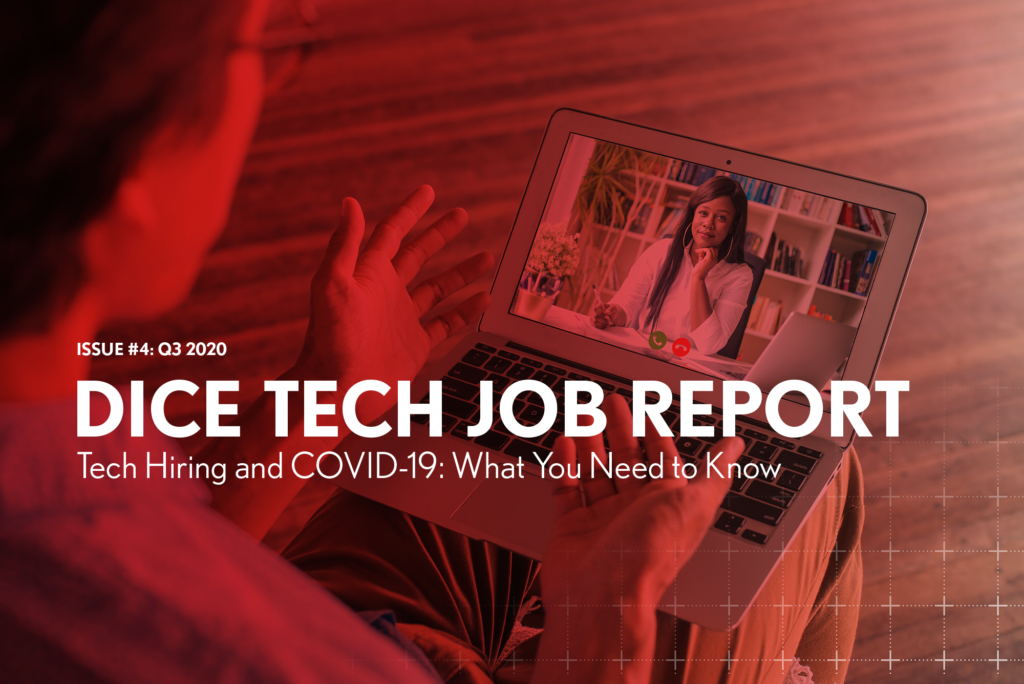After a second quarter few of us are likely to forget, the Q3 Dice Tech Job Report suggests stabilization in technology hiring in the third quarter. Although overall tech job postings were down 7 percent for the quarter (compared to Q2), postings were virtually flat from August to September, which is encouraging given the continued impacts of the pandemic on the economy.
In a promising trend for the quarter overall, more than two-thirds of top employers increased job-posting volumes. In addition, senior roles gained momentum in September, a possible indication that a larger number of mid-level postings will follow in the coming months.
The data shows that hiring trends continue to shift in favor of remote jobs, as well as a rise in postings for occupations related to cybersecurity, systems and architecture. In terms of tech unemployment, the industry remains at a rate of 3.5 percent, far below the national unemployment rate. Overall, the third quarter data suggests that many businesses are learning how to navigate and operate in an economy and landscape dictated by the virus.
The Quarter’s Top Metro Areas
Data from the third quarter shows that the pandemic has impacted the normal spike in job growth from August to September, limiting the expected seasonal increase. Despite that, a variety of U.S. cities showed month-over-month growth, with some locations outside of the traditional tech hubs seeing increases.
New York and San Francisco led the U.S. in tech job postings in the third quarter, with more than 29,000 and 16,000 postings, respectively. In both cities, high-profile organizations (including Twitter, Microsoft, Facebook, Apple and Oracle) have seen their sales and engagement rise, particularly for a variety of cloud-based products; that demand, in turn, has helped buoy hiring.
In New York, Amazon continues to be a leader in job postings, followed by JPMorgan Chase and IBM; the e-commerce giant plans on adding 2,000 jobs, despite canceling plans for a massive “HQ2” headquarters in NYC’s Long Island City neighborhood. In San Francisco, Amazon, Salesforce, Splunk and Twitter all created a significant number of job postings.
Los Angeles and San Diego have long been viewed as less expensive alternatives to San Francisco with in California. While San Diego maintained its spot in the eighth rank, Los Angeles improved by one place during the quarter. In Los Angeles (where job-posting growth hit 16 percent between August and September), the top hiring companies include IBM, Boeing, Deloitte, Northrop Grumman and Anthem Blue Cross, San Diego’s includes Qualcomm, Intuit, Teredata and General Atomics.
In Northern California, there were also bright spots of month-over-moth growth, including in San Jose, where top hiring companies included PayPal, Cisco, eBay and Splunk. In Sunnyvale, which showed 6 percent growth month-over-month, hiring was led by tech giants including Amazon, Google and Microsoft. The strength of San Jose and Sunnyvale shows that Silicon Valley is benefitting from many of the same trends gripping San Francisco just to the north, even though remote-work trends have left some pundits questioning whether technologists will stay in the area. As the country rushes to embrace cloud and mobile services in order to keep businesses running, developers in this technology hub will likely continue to benefit.
Texas’ growth continues to position the state as a rival to California, with the performance of select cities in the third quarter only bolstering that argument. Austin, Dallas, Houston and San Antonio all ranked within the top 20 cities in the quarter, with San Antonio and Austin also making 21 percent and 5 percent gains between August and September, respectively. Hiring in Austin (ranked fifth, although dropped two spots) was led by companies including IBM, Amazon, Deloitte and Home Depot. Moreover, recent announcements from Amazon and Tesla have the state’s future looking particularly bright.
Outside of California and Texas, the city of Charlotte saw a spike month-over-month, showing 11 percent growth from August to September. As one of the primary financial centers in the U.S., Charlotte’s hiring is led by financial institutions like Wells Fargo and Bank of America, as well as consultancies like IBM and Deloitte.
Here's the full list of cities that experienced a rapid growth of tech hiring between August and September:
The full Dice Q3 Tech Jobs Report offers more data and insights into the hiring landscape, including the U.S. cities with the highest apply rates, top tech occupations and skills, top employers for hiring right now, and more. Give it a read!




